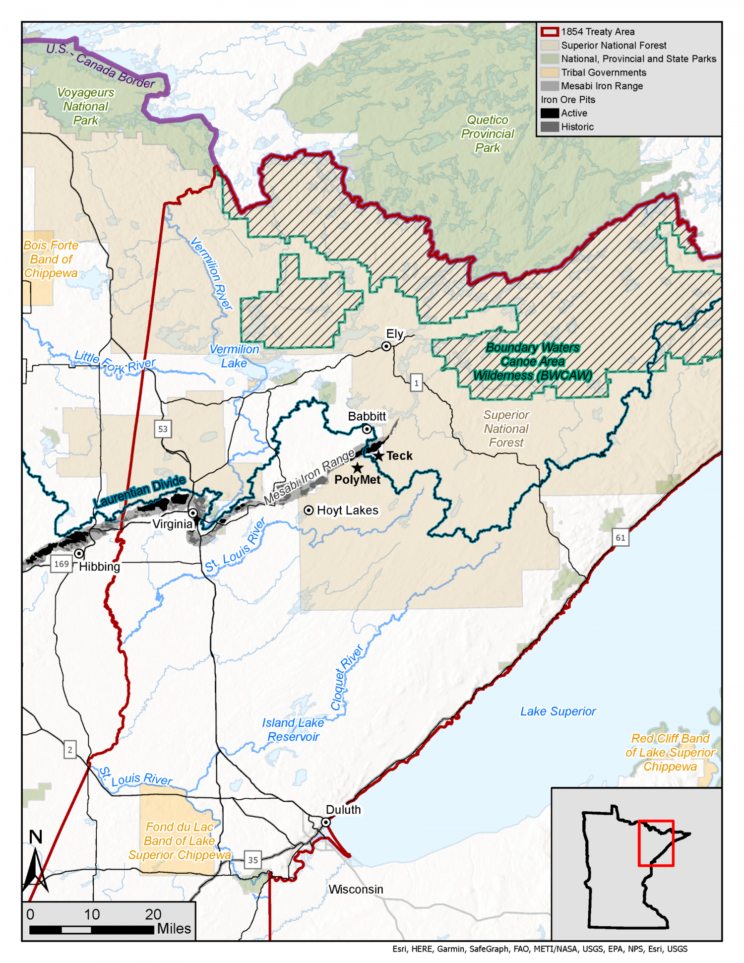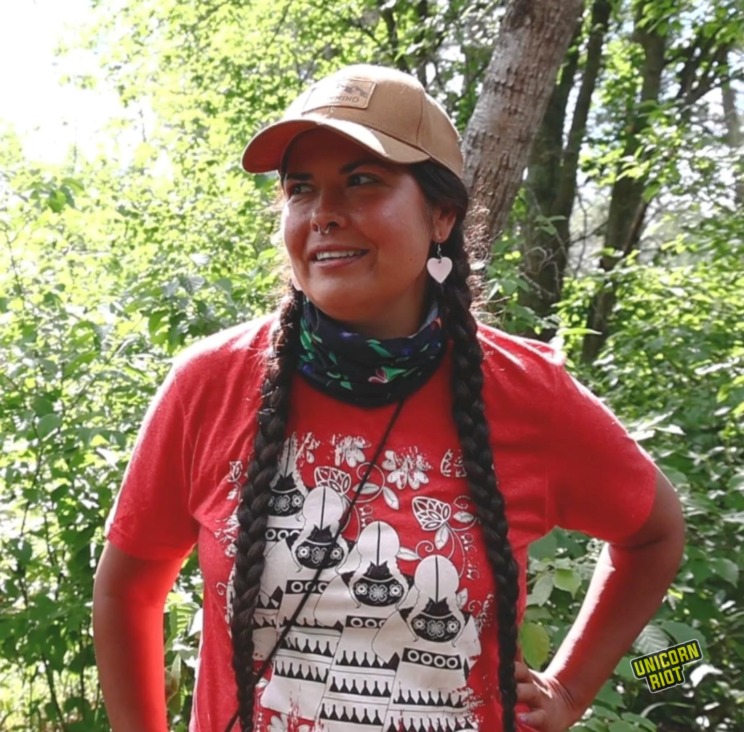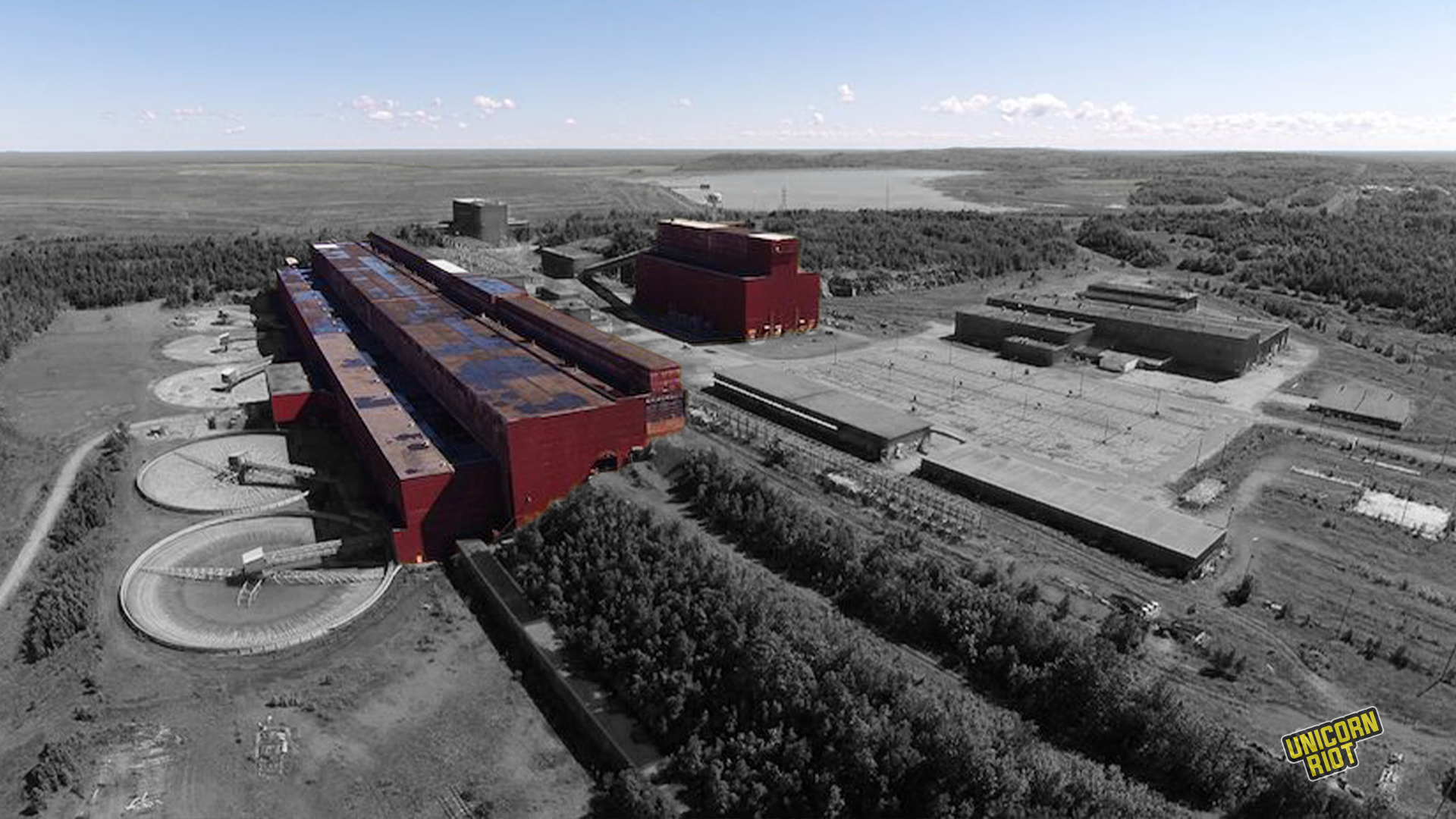Contentious Copper-Nickel Mine Gets Permit Approval from MN Appeals Court
Saint Paul, MN — On Monday, December 18, the Minnesota Court of Appeals upheld a key air permit issued by the Minnesota Pollution Control Agency for a proposed copper-nickel mine formerly known as PolyMet. The company — NewRange Copper Nickel — views the decision as a victory as it attempts to build the first mine for copper, nickel and other precious metals in Minnesota. Environmental groups and the Fond du Lac Band of Lake Superior Chippewa Indians filed a lawsuit to overturn the permit, saying that the Minnesota Pollution Control Agency (MPCA) failed to consider if the company would expand its operations and thus produce more emissions.
NewRange Copper Nickel plans to build a $1 billion open-pit mine near Babbit, Minnesota, with a processing plant near Hoyt Lakes, making the project the first copper-nickel mine in the state. The mine will be operated by Glencore and Teck. It was renamed NewRange Copper Nickel in February 2023, but is still widely known as PolyMet.

The project still faces challenges and it needs other key permits to begin construction, however. Advocates for the billion-dollar mine say the project will provide jobs and resources needed for electric vehicle batteries, solar panels, and other technologies in the transition to a more green economy. Environmental groups and Ojibwe Tribal Nations in northern Minnesota cited the Clean Water Act of 1972, arguing the downstream state clause which says discharge cannot have a “detectable” impact on its waters.
Tara Houska, Ojibwe Tribal attorney and founder of the Giniw Collective, advised stakeholders to look deeper into who funds the mine project. “Understand who is behind the proposed PolyMet copper-nickel mine, now rebranded as the NewRange mine,” she said. “This isn’t taconite mining, it’s incredibly toxic extraction that will contaminate the watersheds, forests, and animals of the Arrowhead region.”
“These companies claim they have no plans to expand, yet they tell their investors they will quadruple production down the line,” Houska said in an interview with Unicorn Riot. “When they inevitably apply for permits, investor reliance will be a factor.”

The Court of Appeals’ Dec. 18 decision on the air permit reaffirms the MPCA, saying that the state regulator “adequately considered” the possibility that developers might expand the project in the future. “The agency followed our remand directions, making ‘reflective’ and undisputed findings that show it carefully considered the salient problems and reveal its reasons for concluding that PolyMet will comply with the permit,” the Court stated in its decision.
The Court also stated: “The agency’s determination that an applicant’s intent to expand operations in the future is not relevant to the current permitting process is consistent with air-emissions permitting generally. Where, as here, there is no claim that the applicant will operate beyond the limits of its synthetic-minor-source permit, any intent to expand in the future is irrelevant.”
Swiss multinational commodity trading and mining company Glencore, which has long been PolyMet’s main investor, completed a takeover of the company in early November when it acquired all remaining shares. According to PolyMet’s website, PolyMet is a wholly-owned subsidiary of Glencore as of November 7, 2023.
Glencore, along with Teck, have troubled histories. Glencore, a large commodity and mining company with a trail of corruption allegations across the world, agreed to pay $1.5 billion to the U.S., the U.K. and Brazil for market manipulation and corruption and $180m to the Democratic Republic of Congo for a decade of corruption in the countries mining activities. Teck has faced millions in fines for contamination and pollution related to its mining activities in Canada.
Glencore plans to reapply for permits to mine and says it will use modern technology to conduct operations using responsible and sustainable practices with aims to extract copper, nickel and other metals from the NorthMet ore body.
Near Hoyt Lakes, in northeastern Minnesota, the NorthMet ore body is a deposit of minerals contained within the geological region known as the Duluth Complex, close to the Bois Forte Band of Chippewa, the Fond du Lac Band of Lake Superior Chippewa, and the Grand Portage Band of Lake Superior Chippewa.
The Fond du Lac Band of Lake Superior was the first federally recognized tribe that challenged the Clean Water Act to acknowledge the Tribe as a sovereign entity. In their lawsuit, they said they were a “downstream state” that has authority to challenge a federal permit. They also pointed out that the U.S. Environmental Protection Agency (EPA) failed to notify the Tribe that the mining project could affect its downstream waters, which is required under the Clean Water Act. Subsequently, in 2021, the U.S. Army Corps of Engineers suspended a key wetlands permit, known as a Section 404 permit, that would utilize nearly 1,000 acres of wetlands near its proposed mine site to dispose of dredged material.
The EPA conducted a review during the suspension of the wetlands permit and later sided with Fond du Lac, saying that the mercury discharged from the mine and released by wetlands impacted by the construction of the mine would violate their water quality standards. The Army Corps has since sided with the EPA. The decision is not a final blow, though.
NewRange Copper Nickel can submit a new application for a wetlands permit. The company could also challenge the decision in federal court.
Six years ago on January 7, 2017 the United States Forest Service issued a decision to approve a transfer of federal lands to PolyMet — a move later opposed by the National Congress of American Indians (NCAI). In October 2017, NCAI passed a resolution at its annual convention in Milwaukee, Wisconsin opposing the land swap and called for the protection of local Chippewa treaty rights.
The mine’s owner’s most recent Dec. 18 decision centered around whether the MPCA failed to consider if the company planned to build a much larger mine that would eventually emit more pollution initially allowed under the initial permit. The court said that the company would comply with the permit and there’s no reason to deny one. The project still needs several permits to proceed with construction.
There are other mining interests in the northeastern region of Minnesota as well. In January 2022, Tesla signed a deal with Talon Metals in Aitken County, Minnesota, to buy 75,000 tonnes (165 million pounds) of nickel over six years, with an option to increase the amount it purchases, making the deal worth $1.5 billion based on the price of nickel. The nickel concentrate will be produced from the Tamarack Nickel Project, which has not begun the permitting process yet. Talon Metals CEO said in January 2022 to U.S. News & World Report that the mine, about 50 miles west of Duluth, would be operational by 2026.
Also in 2022, among numerous protests against extractive mining in Minnesota, was the delivering of a petition against the PolyMet project with thousands of signatures to Minnesota’s Governor Walz by a large coalition of environmental organizations and elected politicians. “Why would we allow the world’s most toxic industry to operate next to some of the world’s cleanest water?” asked Minnesota State Senator Kelly Morrison on January 25, 2022. See more from the 2022 action at the State Capitol in the video below.
“Raise your voice, push Minnesota’s Department of Natural Resources to reject these permits,” Houska said of future actions regarding the region. “Steward and protect the Arrowhead from destruction, for our children’s sake.”
About the author: Darren Thompson is an enrolled citizen of the Lac du Flambeau Band of Lake Superior Chippewa Indians in Wisconsin, where he grew up. His reporting on Indian Country has been published in USA Today, Indian Country Today, Unicorn Riot, the New York Times, Voice of America, the AARP, and many others. He can be reached at his website, www.darrenthompson.net.
Cover image by Niko Georgiades for Unicorn Riot.
Follow us on X (aka Twitter), Facebook, YouTube, Vimeo, Instagram, Mastodon, Threads, BlueSky and Patreon.



